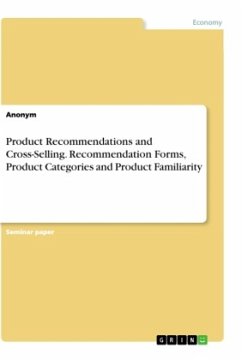
Providing Actionable Recommendations
A Movie Recommendation Algorithm with Explanation Capability
Versandkostenfrei!
Versandfertig in 1-2 Wochen
56,00 €
inkl. MwSt.

PAYBACK Punkte
0 °P sammeln!
Recommender systems (RS) are intended to assist consumers by making choices from a large scope of items. By recommending items with a high likelihood of suiting a consumer¿s needs or preferences, they are able to considerably mitigate the information overload problem at the user¿s side, thus increasing their trust in, satisfaction with, and loyalty to RS providers, such as online shops, internet music catalogs, and online DVD rental services. However, recommendations are prone to errors and often fail to address consumers¿ context specific needs. Explanations of the underlying reasons behin...
Recommender systems (RS) are intended to assist consumers by making choices from a large scope of items. By recommending items with a high likelihood of suiting a consumer¿s needs or preferences, they are able to considerably mitigate the information overload problem at the user¿s side, thus increasing their trust in, satisfaction with, and loyalty to RS providers, such as online shops, internet music catalogs, and online DVD rental services. However, recommendations are prone to errors and often fail to address consumers¿ context specific needs. Explanations of the underlying reasons behind recommendations can allow users to handle algorithmic errors in recommendations and to better judge their suitability for the users¿ current decision contexts, thus increasing the choice efficiency and effectiveness. The latter, in turn, increases the users¿ acceptance of and satisfaction with RS, as well as it positively affects consumers¿ trust in, loyalty to, and credibility of RS providers. However, in order for these benefits of explanation facilities to surface, they should explain the recommendations in such terms that the consumers themselves use when evaluating their choices. The latter sets restrictions upon recommendation algorithms constraining them with respect to how recommendations should be produced and what information they should rely on. This interaction between RS and explanation facilities, however, was not covered by recent research on RS. Therefore, the aim of the current thesis is to narrow this gap and to develop a recommendation technique that accounts for the concurrent objectives of RS, i. e., a method which is capable of providing both accurately predicted recommendations and actionable explanations of the reasons behind them, so that the recommendation process is aligned with the user preference structures.














